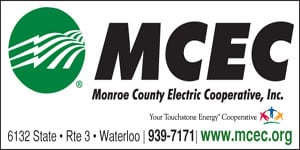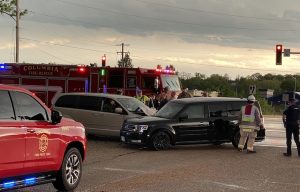Monroe-Randolph Transit District: a people-moving experience
Many citizens of Monroe and Randolph counties have seen short white buses and vans scurrying about, but some may not be well acquainted with what they are and what they are doing.
Characterized by a white-gloved thumbs up symbol and the blue word “Transit” on the doors, these are vehicles of the Monroe-Randolph Transit District public transportation system.
The venture started in December 2005, hardly making a ripple, as it moved some 35 riders that month. Today, about four times that many ride every day — to work, to medical appointments, court appearances or just to go shopping.
In addition to individuals, the system provides transportation for assisted living groups. A near-record 2,966 people rode MRTD vehicles in January 2015, for example.
The service combines passenger fees, state and federal money to operate a fleet of 21 vehicles from two hubs in Sparta and Waterloo. Six full-time and 15 part-time employees pick up and deliver riders.
MRTD Director Jesica Gentry, who has been with the organization since its beginning, recently paused from her busy schedule to talk with the Republic-Times. Gentry wrote original grant proposals in 2004 to get the “people movers” going.
“We are not a taxi service,” Gentry said. “And we are not a charter bus service, either. We provide curb-to-curb service to anyone in our two counties. Services must be scheduled at least 24 hours in advance and are offered from 6 a.m. to 5:30 p.m., Monday through Friday.”
It costs $4 each way for rides within Monroe and Randolph counties. This may be paid on boarding with exact change, or with tickets purchased in advance or in the vehicle.
MRTD vehicles are also authorized to travel to specific medical service locations in St. Clair and St. Louis counties, but those trips cost $10 each way. Riders can also arrange for Medicaid funding of their rides.
Gentry explained the term “curb-to-curb” service.
“Our vehicles are ADA (Americans with Disabilities Act) compliant. We have lifts in each vehicle and drivers are trained to load and unload riders in wheelchairs, and to properly secure them in the vehicles. We also have transfer chairs for those with mobility issues, but who do not require wheel chairs,” she said. “If the rider requires additional help to get into or out of buildings, they can arrange to bring a person to assist them. That person’s ride may be arranged in advance with the paying rider, but the helper will ride both ways for free.”
In addition to providing modern, comfortable, air-conditioned transportation, drivers are well trained and experienced.
Driver schedules are updated as rides are scheduled or changed, with real-time messages from the dispatcher who takes calls from riders. They are downloaded in real time on tablets on the driver’s right.
The system also enables drivers to be updated if a rider’s schedule changes, such as if a medical appointment gets done early or runs late. And finally, the tablet serves as a GPS to help drivers locate unfamiliar addresses.
Riders are given a 30-minute pick-up window when they schedule a ride. If they must cancel, MRTD asks that they do so 24 hours in advance.
“No-shows” cost the service money and may delay another rider’s trip. So, if a person fails to be ready to depart within five minutes of arrival, they can be left behind, and three “no-shows” will result in a loss of service for 30 days.
Five-year veteran MRTD driver Gary Roever said the latter matter is a serious issue.
“Especially if we drive far out into a rural location, and the rider is not there, maybe we could have been providing better service to another user,” he said.
But, Roever added, “I just enjoy helping people get where they wish to go and maybe are unable to drive due to medical issues or maybe not having a dependable car.”
Safety is paramount with MRTD. If bad weather makes roads dangerous, service will be suspended until they are again safe. Notices about weather-related service outages will appear on TV and radio announcements, much like school and other service closings.
Typical uses of MRTD rides are to take people to work, for regularly scheduled medical services such as dialysis treatments, specific doctor’s appointments, for court appearances, day classes at SWIC, and even just shopping. Groups can schedule services, as well.
Several funding sources support the MRTD: Illinois’ Downstate Operating Assistance Program, Federal Section 5311 funds, local support, riders’ fees, service contracts with organizations, and even advertising on buses.
IDOT provides vehicles, including eight slated to arrive this year. Those will replace some aging vehicles and enable increased services during peak use hours.
Gentry urged potential riders to call 618-443-4433 or toll free at 877-443-9087, or visit online at www.facebook.com/MonroeRandolphTransit.








